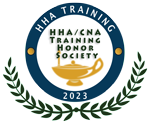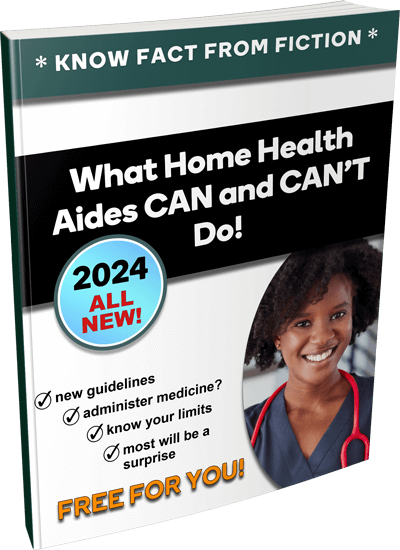Practical Tips for Excelling in Home Health Aide Clinicals
Introduction
Aspiring home health aides (HHA’s) understand the journey from the classroom to the patient’s home is paved with critical hands-on experience.
Clinical rotations play a fundamental role in transitioning theoretical knowledge into real-world practice. It’s important to maximize the value of these experiences, which serve as a practical complement to free HHA classes, by excelling in clinical settings to become a competent and compassionate caregiver.

Understanding Home Health Aide Clinicals
Clinicals are an essential component of HHA training, offering students the opportunity to apply their knowledge in a supervised, real-life care setting. This phase bridges the gap between the knowledge gained from traditional academic training and the practical skills necessary for in-home patient care. For those transitioning from theory to practice, understanding the nuances and expectations of clinical rotations is the first step towards success.
Before Starting Your HHA Clinicals
Research and Preparation
Before diving into clinicals, proactive preparation can set the foundation for a rewarding experience. Utilizing free resources like SNAP HHA free training gives potential HHAs a valuable head start. Moreover, reviewing the specific objectives and expectations of the clinical program enables students to enter their rotations with a solid game plan. Here’s what to focus on:
- Outline your clinical goals
- Understand the scope of care in your assignments
Essential Skills Review
Clinicals will test not just your knowledge but your ability to perform essential care tasks under pressure. Hence, before clinicals commence, it’s important to:
- Refresh your memory on the fundamental HHA skills through reputable sources.
- Practice essential tasks, such as patient hygiene assistance, vital sign monitoring, and safe transfer techniques to ensure proficiency during clinicals.
Making the Most of Your Clinical Experience
Engaging with Instructors and Peers
Clinicals are not just about executing tasks; they are also about the learning environment. Engaging actively with instructors and peers can significantly enhance the clinical experience. Seeking guidance, clarifying doubts, and learning from the experience of others fosters a rich learning environment. Likewise, building a network within your clinical setting can offer a support system and open doors to future career opportunities.
Applying Classroom Knowledge
Applying what you’ve learned in the classroom to real-world situations isn’t always straightforward. Clinicals are the stages where theoretical concepts are transformed into practical skills. The key to success in this domain involves:
- Consistently linking theoretical knowledge with clinical tasks.
- Embracing the practical experience clinicals offer to strengthen and refine your caregiving skills.
Professionalism in Clinicals
Ethics and Conduct
Professionalism is paramount in clinical settings. HHAs must be vigilant in upholding ethical standards and maintaining confidentiality, all while respecting professional boundaries. Committing to a high degree of punctuality, displaying a strong work ethic, and abiding by the code of conduct of your clinical site are non-negotiable elements of your professional persona.
Attire and Behavior
Presenting oneself professionally extends beyond demeanor; it encompasses attire and behavior. Items to consider for clinical success include:
- Wearing the mandated uniform or attire
- Displaying respectful behavior towards patients and staff
Maximizing Learning Opportunities
Asking Questions and Seeking Feedback
A curious mind is an asset in clinical rotations. Proactively asking questions and seeking constructive feedback from your supervisors aids in rectifying weaknesses and optimizing performance. Not only does this exhibit eagerness to learn, but it also demonstrates professionalism and respect for the mentorship process.
Keeping a Reflective Journal
Reflection is a key part of learning. By keeping a journal, you enable yourself to:
- Chronicle your daily experiences in a structured manner.
- Reflect on the learning outcomes and areas requiring improvement.
Recording insights and feedback helps in continuous improvement and can be a valuable asset in preparing for the HHA certification process.
Looking Beyond Clinicals
Planning Your Career Path
The completion of clinical rotations signals the start of a career path that’s rich with potential. Exploring the landscape of HHA state salaries and employment statistics provides a realistic outlook on the job market. As you plan your next steps, consider the possibility of specialization or additional education to further enhance your skills and standings in the healthcare community.
Continuing Education and Certification
The pursuit of excellence doesn’t cease with initial certification. Ongoing education is essential for maintaining skills and up-to-date knowledge. Opportunities for growth might include:
- Attending advanced HHA courses.
- Revisiting home healthcare foundational principles.
Conclusion
Excelling in home health aide clinicals is a fundamental step toward building a successful career in caregiving. By focusing on professionalism, actively engaging in the learning process, and continuously seeking opportunities for growth, HHAs can ensure quality care for their clients and a fulfilling professional journey for themselves.
Key Takeaways for Excelling in Home Health Aide Clinicals
Maximizing your clinical experience as a home health aide requires careful preparation, professional conduct, and a willingness to learn. Here’s a summary of practical tips from the article to help you excel in your clinicals.
| Area of Focus | Key Takeaways |
|---|---|
| Understanding Clinicals | Clinicals serve as a real-life care setting to apply academic knowledge and core skills. |
| Research and Preparation | Use resources like SNAP HHA free training and understand clinical objectives before starting. |
| Essential Skills Review | Practice care tasks such as hygiene assistance, vital monitoring, and safe transfers. |
| Engaging with Instructors and Peers | Seek guidance and build a network for a supportive learning environment. |
| Applying Classroom Knowledge | Link theoretical knowledge with practical tasks during clinicals. |
| Professional Ethics and Conduct | Uphold patient confidentiality, maintain professional boundaries, and exhibit work ethic. |
| Attire and Behavior | Wear appropriate attire and maintain professional behavior at all times. |
| Maximizing Learning Opportunities | Ask questions, seek feedback, and use a reflective journal to record and reflect on learning. |
| Planning Your Career Path | Explore job opportunities and consider further education or specialization. |
| Continuing Education and Certification | Pursue advanced courses and keep up-to-date with certification requirements. |
| Utilizing Available Resources | Take advantage of free classes, training programs, and other HHA resources. |
By adhering to these guidelines, you can ensure that you make the most out of your clinical rotations, setting a strong foundation for a successful career as a home health aide. Always remember that the quality of care you provide is not just about the skills you possess but also about the empathy and commitment you bring to your role.


